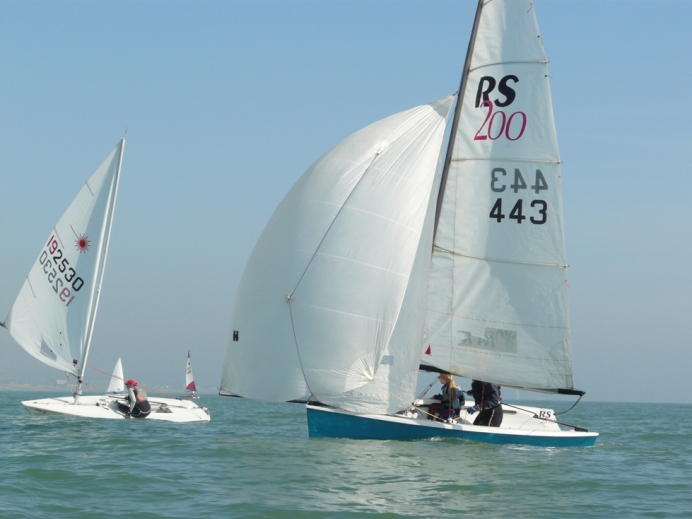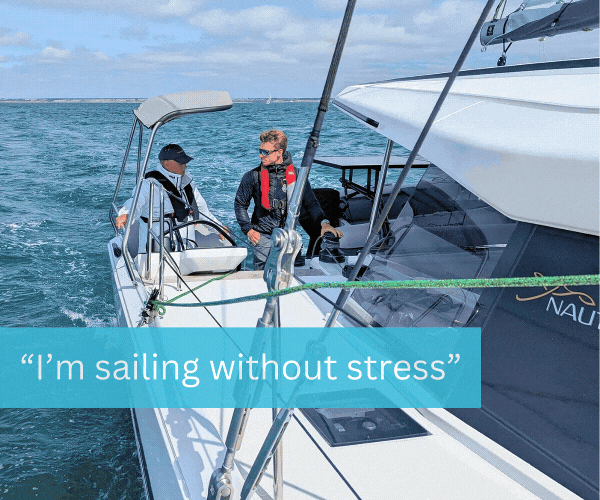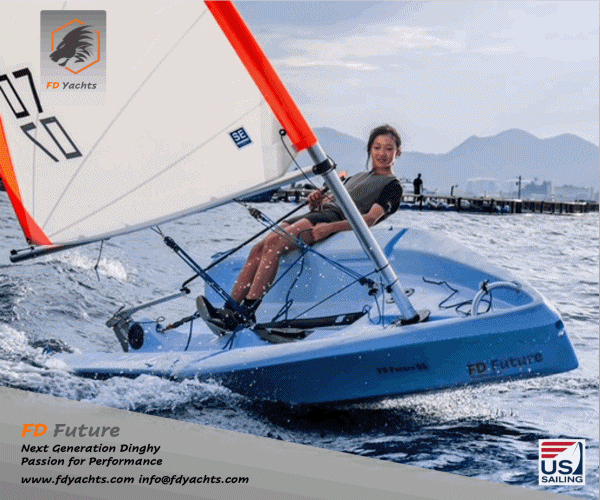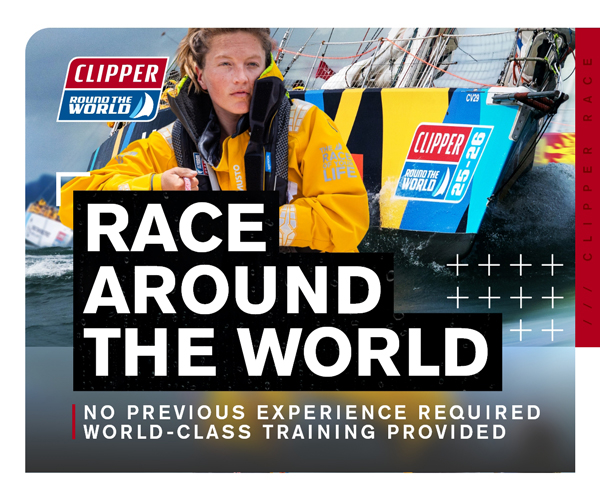International 14 Worlds |
Post Reply 
|
Page <1234 6> |
| Author | |
Kiwi Spy 
Newbie 
Joined: 23 Feb 05 Online Status: Offline Posts: 20 |
 Post Options Post Options
 Quote Quote  Reply Reply
 Topic: International 14 Worlds Topic: International 14 WorldsPosted: 28 Feb 05 at 9:37pm |
|
There are some similarities in the two boats relative points scores
(2004 Star Worlds vs 2005 I-14 Worlds). Loof had a low discard before
the final race, Percy had a high discard.
But there are some significant differences in that all Loof had to do was sail him down to 8th or worse to win. In the 1-14's it was more severe - at least 27th to 34th. Loof started on the first leg, the I-14's didn't start until half way up the last. Loof actually got Percy back to 50th and when they broke off thjen the rapid recovery started. Between both boats (Stars and I-14's) there was only one place difference at the finish which says that if you are going to do the sail down then it is not that realistic to say that you are going to get XX down to 35th place and then finish 15th yourself. In both cases, the reality is that once the tactic is ceased then both boats will recover very rapidly and you can't really get any meat into the sandwich to built the points differential you require. Your best hope is to sail a competitor down to a place worse than his discard and hold him there, taking your foot off his throat and saying that "I'll leave him where he is and jump 10 places myself" seems to be rather fanciful. Percy could have protested, but didn't. Loof was in second place before the final race and won the gold medal - arguably through this tactic. Certainly his intent was clear and achievable and successful. There was also a similar situation at the 2002 Int Contender Worlds in Melbourne when Brett (AUS) was in third place overall behind Bonezzi (ITA) going into the last race. The two match raced from the outset, were dead last and second to last around the first mark and then recovered to finish 39th and 36th respectively. (Again there was no meat in the sandwich once the tactic ceased), however it was successful from Bretts viewpoint in that he won the worlds and Bonezzi finished 3rd. Looking at the similarities again Bonezzi had a 10th as a worst place at Race 6, Brett had a 3rd. So Brett could finish anywhere in the fleet but had to get Bonezzi past 10th - which in a 64 boat fleet and attacking from the start was not that big an ask. KS Edited by Kiwi Spy |
|
 |
|
Contender443 
Really should get out more 

Joined: 01 Oct 04 Location: United Kingdom Online Status: Offline Posts: 1211 |
 Post Options Post Options
 Quote Quote  Reply Reply
 Posted: 28 Feb 05 at 9:31pm Posted: 28 Feb 05 at 9:31pm |
Sorry Rick but I have to disagree. This situation is clearly a one on one, more of a match race. This is acceptable to most sailors The incident at the I14 Worlds is more about team racing in a fleet race which is not acceptable. |
|
|
Bonnie Lass Contender 1764
|
|
 |
|
Guest 
Newbie 
Joined: 21 May 04 Location: United Kingdom Online Status: Offline Posts: 0 |
 Post Options Post Options
 Quote Quote  Reply Reply
 Posted: 28 Feb 05 at 1:58pm Posted: 28 Feb 05 at 1:58pm |
|
It was me who posted about Percy. It was the Star worlds in 2003 - Loof nailed Percy who was pretty unhappy at the situation as Loof "overdid it" but he took it on the chin. Loof only needed to sail Percy to 8th but in the end they finished 27th & 28th which was pretty hard as it let through another boat into silver. Here is a quote; “We are a bit disappointed as we didn’t think Freddie [Loof] needed to do as much damage as he did, we both went from first and second to 31st and 32nd. See http://www.yachtsandyachting.com/default2.asp?section=11& ;article=12826 Seems to me the situation is very similar. Rick |
|
 |
|
Kiwi Spy 
Newbie 
Joined: 23 Feb 05 Online Status: Offline Posts: 20 |
 Post Options Post Options
 Quote Quote  Reply Reply
 Posted: 28 Feb 05 at 2:53am Posted: 28 Feb 05 at 2:53am |
|
Think it was a Worlds but not sure - someone else mentioned on I looked at both My point is that only A actually knows whe While Case 78 does
talk about "intent" ("provided that this tactic is intended to benefit
her own series result") it follows that this "intention" must have some
rational basis, and that once Also interesting - surely A should have But we are in agreement here - Unfortunately PC's and Juries sometimes have to make decisions based on wildly differing evidence. All If one party thinks the Jury has got wrong - even an International "no appeals" Jury they have the right within a certain time-frame to request a re-opening. So there is some protection against a "wrong decision". I think you'll find that in instances where the Jury has made a mistake, they will be only too ready to amend their original decision and correct the situation, if that is the appropriate action, and there is new evidence. I also find it interesting because I have been in It would depend on when you started your tactics and o We have all seen match races for fleet championships - but
KS Edited by Kiwi Spy |
|
 |
|
sargethesailor 
Newbie 
Joined: 21 Feb 05 Online Status: Offline Posts: 12 |
 Post Options Post Options
 Quote Quote  Reply Reply
 Posted: 27 Feb 05 at 9:20pm Posted: 27 Feb 05 at 9:20pm |
|
Think it was a Worlds but not sure - someone else mentioned on the other thread that Percy had been sailed out of second when Loof took him further back than required to improve his own score. There was no allegation of team-racing but the reading of case 78 above implies that there might have been a case to answer nevertheless! My point is that only A actually knows whether it is intended to improve A's score - or someone elses, when circumstances are as they are in the Barker case. So if this IJ decision was taken as case law we would have a game change if A's actions could also improve C's positions. Effectively the tactic would be v high risk if more than one boat's position could be improved and especially if any connection between A and C could be construed or implied, whether supported by evidence of dinners to discuss tactics or not. Also interesting - surely A should have the right to put some extra places in the bag? Especially as nothing is ever certain on a last beat. But we are in agreement here - the current case law is fine. What we may or may not disagree over is the use it has been put to by this IJ who effectively made a decision based on circumstantial evidence and a subjective assessmant of the situation made with hindsight to say that Barker and Co, the boat A in this situation, were not attempting to improve their own position , and were not in a position to do so. I also find it interesting because I have been in the boat A situation with a great deal to achieve in a sailback situation if I wanted to take second in a Nats. I gave it my best shot and failed by 3 places - had another boat benefitted from my actions I could presumably have been protested if this IJ's decision is used as a guide. But had I been successful I would by performance have proved my case. That is no way for the case law to lead us.
|
|
 |
|
Kiwi Spy 
Newbie 
Joined: 23 Feb 05 Online Status: Offline Posts: 20 |
 Post Options Post Options
 Quote Quote  Reply Reply
 Posted: 27 Feb 05 at 8:15pm Posted: 27 Feb 05 at 8:15pm |
KS Edited by Kiwi Spy |
|
 |
|
sargethesailor 
Newbie 
Joined: 21 Feb 05 Online Status: Offline Posts: 12 |
 Post Options Post Options
 Quote Quote  Reply Reply
 Posted: 27 Feb 05 at 12:55pm Posted: 27 Feb 05 at 12:55pm |
|
On the subject of rule 69 surely there could be no action due to a lack of evidence with a high enough standard of proof: It would need something like a witness saying: Clearly unlikely - but surely closer to the conclusive evidence required of RRS 2 - and the even higher standards of proof for 69.
|
|
 |
|
sargethesailor 
Newbie 
Joined: 21 Feb 05 Online Status: Offline Posts: 12 |
 Post Options Post Options
 Quote Quote  Reply Reply
 Posted: 27 Feb 05 at 12:51pm Posted: 27 Feb 05 at 12:51pm |
|
I justy hope ISAF don't ake this for Case Law. Cases 78 and 34 established B's rights to be sailed back fairly - and A's responsibility to act only in accordance with rules of part 2 and on the same lap and leg. 34 creates special circumstances where B could get redress without there having been damage. Case Law derived from this decision would have a very different effect. My view is probably not - as long as the conditions are fulfilled - Surely A only has to think he can do it - because as is pointed out B has no need to alledge the infringement of RRS2 unless A has achieved his aim and therefore there can be no offence! At the other end of the scale you have a situation where A's tactics and objectives were clearly impossible to achieve from the outset, were wildly ambitious during the course of the race but were pursued nevertheless causing boat B to drop several places in her overall score, and A's series score did not improve? Is that Fair Sailing? Yes but thi requires a fairly bizarra set of circumstances! In the end RRS2 is a shield in the hands of B against attack by A, not a sword. Agreed I think that this decision does not introduce grey into the normal boat on boat sail back. But it has serious implications if there is the chance of another competitor benefitting - as here. In such a situation (and someone has cited Loof v Percy in Stars when Percy lost Silver he was sailed back so far) a competitor would have to be very wary of adopting sailback tactics, the right to which are enshrined in the rules - and which I believe should remain so - when putting themselves in jeopardy of a "team-racing RRS2 protest. |
|
 |
|
Guest 
Newbie 
Joined: 21 May 04 Location: United Kingdom Online Status: Offline Posts: 0 |
 Post Options Post Options
 Quote Quote  Reply Reply
 Posted: 26 Feb 05 at 7:51pm Posted: 26 Feb 05 at 7:51pm |
|
CHris, We are all entitled to our opinions and unlike many I put my name to mine. This forum is here to share views - just because we don't have all the facts dosn't mean we can discuss what is in the open. The IJ didn't have all the facts either just what they established. The only ones who really know the truth ar the sailors. I think this decsion was wrong and that's not because it resulted in a Aussie boat winning but in that it drew conclusions with the benefit of hindsight and implied pre arranged cheating and I don't believe that happened knowing some of the people involved. Yes we all no doubt have national bias but based on what I have seen I think this is "fishy" and was a nice "get out of jail" option for the winners. Of all the postings (including the ones that were only on the forum for a short time before they were removed for foul language) I would say that most national bias has been demonstrated by people from the southern hemi-sphere but hey - I am biased of course - as are you ... Also, if you knew me you'd also know that I enjoy a good argument and often take to baiting people to get the ball rolling - it seems to have worked ... regards Rick
|
|
 |
|
Stefan Lloyd 
Really should get out more 
Joined: 03 Aug 04 Online Status: Offline Posts: 1599 |
 Post Options Post Options
 Quote Quote  Reply Reply
 Posted: 26 Feb 05 at 3:48pm Posted: 26 Feb 05 at 3:48pm |
|
The two GBR boats are not "my team". I've never met the guys, it is unlikely I ever will, and their being British is of zero interest to me. We are not talking an Olympic "Team GBR" here. With a couple of exceptions, I think this discussion has been extremely balanced and I think you are being hyper-sensitive to conclude otherwise. I'm sure we'd all like to know exactly what happened in the protest room. I find it hard to believe the report we have says it all. So yes it would be nice to have more information to inform this discussion, but we are not going to get it. Your argument seems to be that we should therefore not discuss it. I don't agree. It was, by any standards, a very significant decision for sailing, and it is a legitimate topic for discussion. It is unfortunate that the IJ did not foresee that and make their protest findings document a little more comprehensive. I don't see the discussion here as an attack on the IJ. It is discussion and questioning. That is not the same thing. It was clearly a difficult case to decide.
|
|
 |
|
Post Reply 
|
Page <1234 6> |
| Forum Jump | Forum Permissions  You cannot post new topics in this forum You cannot reply to topics in this forum You cannot delete your posts in this forum You cannot edit your posts in this forum You cannot create polls in this forum You cannot vote in polls in this forum |
Copyright ©2001-2010 Web Wiz
Change your personal settings, or read our privacy policy


























 Printable Version
Printable Version Delicious
Delicious Digg
Digg Facebook
Facebook Furl
Furl Google
Google MySpace
MySpace Newsvine
Newsvine reddit
reddit StumbleUpon
StumbleUpon Twitter
Twitter Windows Live
Windows Live Yahoo Bookmarks
Yahoo Bookmarks Topic Options
Topic Options